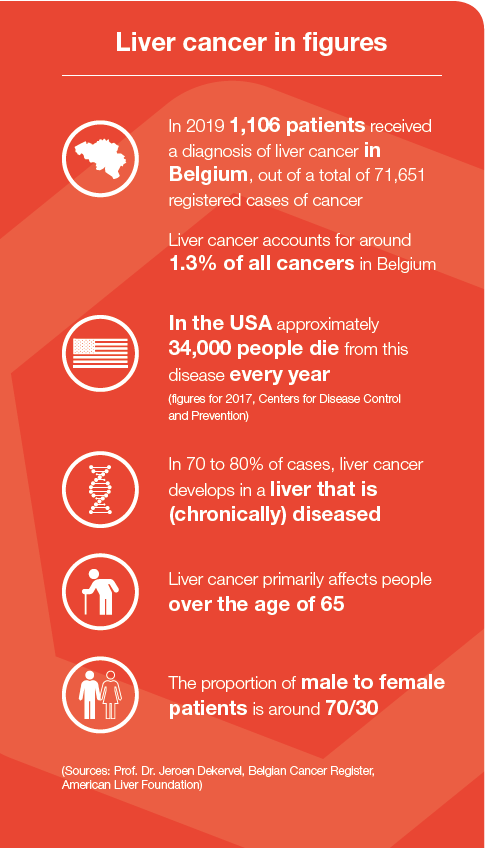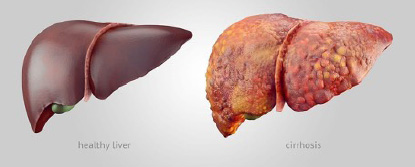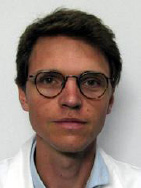Interview with Prof. Dr Jeroen Dekervel,
gastroenterologist and digestive oncologist at the University Hospital of Leuven
“Due to the rising number of new diagnoses, liver cancer threatens to become one of the five most deadly forms of cancer by 2030.”
These are the words of Prof. Dr Jeroen Dekervel, gastroenterologist and digestive oncologist at the University Hospital of Leuven.
In this article he explains why liver cancer is advancing and the treatments that are currently available.
Liver cancer in figures
“The number of new diagnoses of liver cancer in Belgium is rising year by year”, confirms Jeroen Dekervel. “The most recent figures published by the Belgian Cancer Register (for 2019) record 1,106 new cases, comprising 804 diagnoses in men and 302 in women. When you consider that in 2019, 71,651 new cancer diagnoses were reported overall in Belgium, the number of liver cancer cases as a proportion does not appear to be toobad. However, what is alarming is the fact that the number of diagnosed liver cancers is increasing every year. In 2010 there were approximately 680 new cases, and in 2015 around 940.”

“Looking at this year-on-year increase, we’re not just seeing this rising trend in Belgium, but also worldwide. If the projections are accurate, liver cancer will be the third most frequent cause of cancer-related death in 2030, after lung cancer and cancer of the pancreas. An especially worrying fact is that the number of cases of liver cancer is continuing to rise, whilst the numbers in respect of other types of cancer are falling. The focus on raising awareness and treatment of lung, colorectal and breast cancer, for example, has possibly played a significant role here. Liver cancer remains a type of cancer that hasn’t had enough light thrown on it.”
“Another typical characteristic of the disease is the high average age of patients, with mainly those over the age of 65 years being affected. It’s also important to know that the proportion of men to women affected is around 70/30.”
The liver:
An indispensable organ in the human body
The liver is an important and versatile organ in our body.
Jeroen explains its most important functions: “The liver is the largest internal organ in the human body. Unlike some other organs, the liver is indispensable, specifically because it fulfils so many functions. One of them – and perhaps the one best known to most people – is its role as a filter for rendering toxic substances innocuous. Without this detoxification our body would be unable to process waste matter, with all the consequences that would entail. Because the liver is directly linked to the intestinal system, the organ also plays an important role in assimilating foodstuffs and turning them into building blocks for our body’s constitution. In other words, the liver acts as a storage depot for sugars, fats and certain vitamins and minerals and produces essential substances, such as proteins and fats.”
“In addition the liver is also responsible for producing bile (which is necessary for the digestion of fats), breaking down the body’s own hormones, and producing coagulation factors that are needed to stem bleeding.”
Types of liver cancer
“Cancer of the liver is usually a metastasis of another type of cancer,” explains Jeroen. “In such cases it is not strictly speaking a case of liver cancer; the disease gets its name from the organ in which it originates, as in the case of metastasised colorectal cancer. Only if the disease originates in the organ itself do we talk of (primary) liver cancer.”
“The most widespread type of primary liver cancer is hepatocellular carcinoma (HCC). Usually several tumours originate in the liver at the same time. In addition to HCC, we also sometimes see the occurrence of bile duct cancer, with a tumour in the small bile duct and in the liver.”
How does liver cancer start?
“In 70 to 80% of cases, HCC originates in a liver that is already (chronically) diseased”, Jeroen points out. “Chronic liver disease is often linked to one of the following causes: viral infections – in this case chronic hepatitis B and C, which are predominantly encountered in Africa and South East Asia –, a chronic excessive consumption of alcohol and a non-alcoholic fatty liver, caused by a combination of unhealthy lifestyle habits such as smoking, poor diet, lack of physical activity, etc.”
Because liver cancer seldom develops in a healthy liver, a healthy lifestyle remains the best way of avoiding the disease. “We are increasingly seeing cases of patients with a damaged liver caused by an unhealthy lifestyle. I regard this as an alarming trend. As in other types of cancer, the population should be made aware of the dangers of liver cancer and of the ways of avoiding the disease. A greater mobilisation in the field of prevention always pays off!”
“Hepatitis B in our country is a less important risk factor, because protection against this virus is included in the standard vaccination plans for children. There is no vaccine available yet in the fight against hepatitis C, although there is a very good medicinal treatment.”
Symptoms can often be vague
Early-stage liver cancer often only gives rise to vague symptoms, if any. “One of the reasons for this is the fact that the liver is such a large organ and therefore has a large reserve capacity,” Jeroen explains. “In the case of mild inflammation and mild scarring, the organ can continue to function well. However, the scenario changes when there are more sizeable lesions, particularly in the case of a liver that is already cirrhotic (healthy liver cells that are destroyed and gradually replaced by scar tissue, ed.). In such cases we sometimes see decompensation occur, when the organ gives a signal that it can no longer do its job due, for example, to a growing tumour that further attacks the liver tissue. Jaundice can then often appear – a symptom that serves to get the necessary alarm bells ringing for both the patient and the physician.”
What other symptoms can point to liver cancer? “A bloated belly – due to liquid retention – is often symptomatic of a liver that is working less effectively. A diminished appetite, unexplained weight loss, or pain in the upper right-hand part of the stomach, also call for the necessary attention. However, it should be pointed out that these symptoms may be caused by other disorders, so a thorough check-up in the event of such symptoms is always important and recommended.”
Various stages of the disease
When liver cancer is diagnosed, a number of examinations will be carried out to determine the stage in which the disease can be classified. “In this appraisal we take account of the location and size of the tumour(s), the number of tumours and the presence of metastasis in glands and other organs”, affirms Jeroen. “We also look at the patient’s age, his or her physical condition, and the degree to which the liver is still functioning properly. Is it a small lesion in a healthy organ, or do we find dozens of lesions in a diseased liver? Based on this analysis we distinguish four stages in liver cancer: early, intermediate, advanced and terminal.”
“The wide range of factors to be considered makes the treatment of liver cancer highly complex. Unlike other types of cancer, the question always arises during treatment as to how well the liver is still functioning. In other words, the organ’s current condition at any given time is a crucial factor in the choice of a treatment method.”

Left: a healthy liver – right: a cirrhotic liver with scar tissue
(Source: American Liver Foundation)
Bio
Prof. dr. Jeroen Dekervel

Prof. dr. Jeroen Dekervel works as an oncologist in the Department of Clinical Digestive Oncology at UZ Leuven (Belgium). He treats all types of gastrointestinal malignancies in one of the largest clinics of its kind in Europe. Jeroen is also a professor at KU Leuven, where his research focuses on investigating factors associated with success and failure of immunotherapies in hepatocellular carcinoma. He is a member of ESMO (European Society for Medical Oncology) and ASCO (American Society of Clinical Oncology).
Unique multidisciplinary approach to treatment
Due to this complex puzzle the treatment of liver cancer is approached holistically, i.e. by means of consultation between the GP and specialists from various disciplines.
“A single specialist cannot deal with liver cancer. In addition to a radiologist, pathologist, oncologist and surgeon, the discussion of a treatment may also involve a hepatologist, a transplant surgeon and an interventional radiologist. The attending physician then discusses the final treatment proposal with the patient, further to which the definitive treatment is established in consultation.”
What (combinations of) treatments are possible? Jeroen sums up the main avenues that can be explored: “The excising or burning-off of a lesion or a tumour is a first option. However, this is only possible if the disease is in an early stage and the liver is still working well. After this type of surgery, a healthy liver will grow again within a few weeks. Since a cirrhotic liver does not have this reserve capacity, the removal of a large amount of organ tissue is not possible.”
“In the case of a small tumour or a small number of tumours, we can consider a liver transplant, but this treatment is not always possible,” states Jeroen. “For a transplant to be considered, the other organs have to be in good condition, combined with a good chance of the disease not recurring after the operation. On top of that there is the common problem of a shortage of liver donors. This means we have no choice but to work with a waiting list, which of course is not an ideal solution, since patients having to wait too long for a transplant run the risk of tumours continuing to grow during this period.”
“When liver cancer is at an intermediate stage we can also use so-called loco-regional treatments, involving local radiation treatment or chemotherapy administered directly into one of the liver’s blood vessels,” Jeroen goes on. “Because chemotherapy is not very effective in liver cancer, immunotherapy is the preferred treatment when the cancer is at an advanced stage. For this we use medicines that stimulate the natural defences or immunity to attack and clear out the cancer cells, combined with angiogenesis inhibitors that have an effect on the production of blood vessels in the tumour.”
As a final treatment method Jeroen refers to purposive therapy. “This also entails medicines, but used in a goal-oriented fashion to curb or halt the growth of cancer cells.”
What does the future hold in the way of treatment?
Research and development in the field of new therapies is ongoing and new possibilities are emerging for the treatment of liver cancer. Jeroen looks to the future. “A combination of immunotherapy with new medication could be a promising way forward. Also the use of that same immunotherapy at an earlier stage of liver cancer could offer prospects, for example surgery with follow-up treatment using immunotherapy. And in the long term we are eagerly looking forward to the use of animal organ transplants (the transplanting of organs or tissues between different species, mostly between man and animal, ed.), although there are still a lot of hurdles to be cleared in that area.”
Prevention is better than cure
Despite the list of innovative treatment methods, prevention remains the best and cheapest way of averting liver cancer. In this context Jeroen argues in favour of the development of a simple, accessible blood test or marker that patients and their doctor would be able to use to measure the state of health of the liver in a timely manner. “At the moment we can’t measure this effectively by means of a blood sample or an ultrasound scan. Primary healthcare, with GPs at the forefront, is the ideal lockkeeper for tracing and looking after high-risk patients in the context of liver cancer. The prevalence of hepatitis B and C is relatively high among intravenous drug users, (former) inmates or foreign patients from specific risk countries. Extra attention needs to be paid to patients with high alcohol consumption and/or an unhealthy lifestyle. At the University Hospital of Leuven we are developing initiatives, in conjunction with GPs, for the early tracing of patients with liver diseases. Together we stand firm!”
Inspiring websites
Everything about cancer (liver cancer): www.allesoverkanker.be/leverkanker
Make a stand against cancer: www.komoptegenkanker.be
European Society for Medical Oncology: www.esmo.org
American Society of Clinical Oncology: www.asco.org
American Liver Foundation: www.liverfoundation.org
